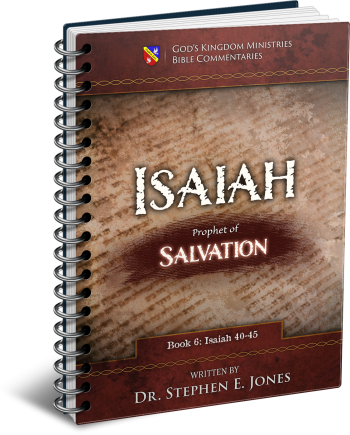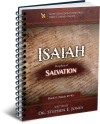Latest Posts
View the latest posts in an easy-to-read list format, with filtering options.

Isaiah is the prophet of Salvation. He is also known as the truly "Universalist" prophet, by which is meant that He makes it clear that salvation is extended equally to all nations and not just to Israel. He lived to see the fall of Israel and the deportation of the Israelites to Assyria, and he prophesied of their "return" to God (through repentance). He is truly a "major prophet" whose prophecies greatly influenced the Apostle Paul in the New Testament.
Category - Bible Commentaries

Isaiah 45:1 says,
1 Thus says the Lord God to Cyrus His anointed [meshiach, “christened one, Messiah, Christ”], whom I have taken by the right hand to subdue nations before him and to loose the loins of kings; to open doors before him so that gates will not be shut;
This continues God’s word to King Cyrus from the previous verses in chapter 44, where he was called “His servant” (Isaiah 44:26) and “My shepherd” (Isaiah 44:28). Isaiah 45:1 takes it a step further, where Cyrus is called “His anointed,” that is, God’s Christ.
Anyone who has an anointing or calling to do the work of God is technically a messiah (Hebrew) or Christ (Greek). Yet all such anointed ones are only prophetic types of the one true Messiah, Jesus Christ. Cyrus was not the Messiah, but God did anoint him to decree that Jerusalem would be “built” and “inhabited” (Isaiah 44:26). He was also anointed to tell the river, “Be dried up!” (Isaiah 44:27), even as Joshua had commanded the Jordan River to be dry (Joshua 3:17).
Joshua let the people return to the Promised Land from Egypt, whereas Cyrus allowed the people of Judah to return to the Promised Land from Babylon. Both Joshua and Cyrus were anointed messiahs in their day; both were prophetic types of Jesus Christ, the one true Messiah who was anointed to set us free from the bondage of sin.
The anointings of Joshua and Cyrus were limited in scope and effectiveness, for neither could set men free from mortality or corruption dating back to Adam. Their callings were great in their day but not as all-encompassing as the calling of the one true Messiah. It is important for us as believers to understand this, because we too are anointed ones. 1 John 2:20, 27 says,
20 But you have an anointing [chrisma] from the Holy One, and you all know… 27 As for you, the anointing [chrisma] which you received from Him abides in you, and you have no need for anyone to teach you; but as His anointing [chrisma] teaches you about all things, and is true and is not a lie, and just as it has taught you, you abide in Him.
Chrisma is the anointing of a messiah, or Christ. As part of the body of Christ, we are all anointed by the same Spirit, each in his own unique way, to be types of Christ in limited ways. Though Jesus is the only Messiah who could pay for the sin of the world, we ourselves often pay the price of intercession. Ezekiel interceded for Israel and Judah, and God said to him, “you shall bear their iniquity” (Ezekiel 4:4). This is the same wording that we see in the prophecy of Jesus Christ in Isaiah 53:4, “Surely our griefs He Himself bore, and our sorrows He carried.”
While Jesus bore the sin of the whole world, we, as types of Christ and as intercessors, are called to bear only a small portion of the load. So also, Moses could be a type of Christ in leading Israel out of Egypt, but only Joshua—another type of Christ—could lead the people across the Jordan River. Aaron was another type of Christ in his role as a high priest. The judges in Israel were types of Christ in their role as deliverers from foreign captivity. Cyrus was a type of Christ in his calling to overthrow Babylon, “to subdue nations” (Isaiah 45:1), to set free the people of Judah, and to build Jerusalem.
Cyrus’ calling “to subdue nations” is described by Herodotus, the historian,
“While Harpagus was turning upside-down the lower, or western, part of Asia, Cyrus was engaged with the north and east, bringing into subjection every nation without exception.” (The Histories, Book 1, par. 176).
No doubt Cyrus thought that he was successful because of his good strategy and the great army that he commanded. Prior to taking the city of Babylon, and before he was able to talk to Daniel, Cyrus was a blind messiah—blind to the truth, not knowing the God of Israel who was directing His steps and making him successful. Only after he conquered Babylon did he learn that God had called him by name more a century earlier. Only then did he see that Daniel had prophesied of his kingdom.
Nonetheless, everything Cyrus did confirmed the earlier prophecies. Everything he did bore witness to the word of God. Cyrus was a blind servant yet was one of God’s witnesses.
Isaiah 45:2 says,
2 “I will go before you and make the rough places smooth; I will shatter the doors of bronze and cut through their iron bars.”
The city of Babylon was surrounded by high walls 14 miles on each of four sides, or 56 miles in all. The gates of the city were made of bronze, as the Greek historian, Herodotus, wrote about 2,500 years ago:
“It is surrounded by a broad deep moat full of water, and within the moat there is a wall fifty cubits wide and two hundred high…There are a hundred gates in the circuit of the wall, all of bronze with bronze uprights and lintels.” (The Histories, Book 1, par. 180).
The numbers themselves are prophetic. Babylon was Jerusalem’s rival, even as Mystery Babylon is today the rival of the heavenly Jerusalem. Babylon was therefore a counterfeit of the Kingdom of God. So its walls were fifty cubits wide, which simulated a Jubilee—pretending to make men free by subjecting them to its rule. However, the walls were 200 cubits high, which is the biblical number of insufficiency. Hence, we read in John 6:7,
7 Philip answered Him, “Two hundred denarii worth of bread is not sufficient for them, for everyone to receive a little.”
So we see that when Babylon tried to defend itself from Cyrus the messiah, its wall proved to be insufficient in spite of its apparent strength. It is the same with modern Mystery Babylon, whose “Wall Street” is also insufficient to save the world economic system from being captured and replaced by the true Messiah. This is prophesied in Jer. 51:58,
58 Thus says the Lord of hosts, “The broad wall of Babylon will be completely razed and her high gates will be set on fire; so the peoples will toil for nothing, and the nations become exhausted only for fire” [i.e., only to see it destroyed by fire].
The Euphrates flowed through the center of the city, and there were walls and gates along the riverbanks to protect each half of the city from armies that might attack by boat. Herodotus describes it this way:
“The Euphrates, a broad, deep, swift river which arises in Armenia and flows into the Persian Gulf, runs through the middle of the city and divided it in two. The wall is brought right down to the water on both sides, and at an angle to it there is another wall on each bank… The main streets and the side streets which lead to the river are all dead straight, and for every one of the side streets which lead to the river there was a bronze gate in the river wall by which the water could be reached.” (The Histories, Book 1, par. 181).
Isaiah 45:3 says,
3 I will give you the treasures of darkness and hidden wealth of secret places, so that you may know that it is I, the Lord, the God of Israel, who calls you by your name.”
Besides the treasury building, which was defended by strong gates, there were also tunnels in the darkness underground that stored greater wealth. Scripture says that Cyrus discovered this wealth as well. No doubt Daniel pointed out to Cyrus how this prophecy had been fulfilled. The wording in Isaiah 45:3 suggests that this would convince Cyrus that the God of Israel had indeed called him by name.
Prophetically speaking, Isaiah was referring also to the wealth of Mystery Babylon in our time. Christ Himself will be given the wealth of Babylon to use in a new debt-free monetary system that will bring prosperity to the world and end the huge disparity between the rich and the poor.